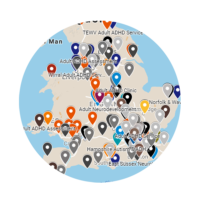ADHD (Attention-deficit hyperactivity disorder)
-

Sleep Edition
This edition of The Bridge concentrates on sleep, a poignant reminder that I am editing this on a 6am train to London having shortened my own sleep cycle and feeling rather sleep deprived on this dark winter morning.
Read more -

Improvements of adolescent psychopathology after insomnia treatment: Results from a randomized controlled trial over one year.
Many adolescents experience sleep problems, which can be caused by hormonal changes during puberty, and social changes with increasing complexity of daily life while growing up.
Read more -

In Conversation… Intellectual Disabilities
Dr Mark Lovell, and Mary Busk, talk to journalist Jo Carlowe about Intellectual Disabilities from a professional and personal viewpoint.
Read more -

ADHD Masterclass
“Excellent speakers, very interesting, thoroughly evidence-based and engaging” Previous delegate Learning outcomes and key takeaways Consider whether therapeutic intervention for ADHD depends on scientific progress Understand the role of genetic and environmental factors in the aetiology of ADHD, and the implications for treatment Recognise that ADHD is a neuro-biologically heterogeneous condition, and ask whether it is […]
- Event type
- Masterclass
- Location
- London
-

Online ADHD service map aims to stop young people slipping through net
Researchers at the University of Exeter have released a map put together from the results of a national survey. The new map aims to help identify existing services and gaps in provision for young adults with Attention Hyperactivity Deficit Disorder (ADHD).
Read more -

ADHD Masterclass
Learning outcomes and key takeaways Consider whether therapeutic intervention for ADHD depends on scientific progress Understand the role of genetic and environmental factors in the aetiology of ADHD, and the implications for treatment Recognise that ADHD is a neuro-biologically heterogeneous condition, and ask whether it is important to tailor treatments to address different causal profiles […]
- Event type
- Masterclass
- Location
- London
-

Routine screening is needed to identify language problems in children with ADHD
In 2017, Emma Sciberras and colleagues conducted a Research Review for the Journal of Child Psychology and Psychiatry to rigorously analyse how common are language problems in children with Attention-Deficit Hyperactivity Disorder. Here, the researchers discuss their main findings and explain why they consider that a screen for language function would be a valuable addition to current ADHD assessments.
Read more -

JCPP Editorial: Volume 59, Issue 10, October 2018
“Troubled trajectories – new insights on risk pathways and developmental phenotypes of ADHD and externalizing problems” by S. Alexandra Burt, Jeffrey M. Halperin & Albertine J. Oldehinkel
Read more -

A cognitive neuroscience review of the aetiology of ADHD
A simple neurological explanation has yet to identify an aetiology and pathogenesis of the disorder. However, advancements in imaging techniques should help to give a more detailed understanding of the brain regions that are different to those without ADHD.
Read more -

Depression is highly prevalent but under-reported in children with ADHD
Researchers at Cardiff University have investigated whether the symptoms of depression observed in patients with attention-deficit/hyperactivity disorder (ADHD) differ from those reported in the general population.
Read more